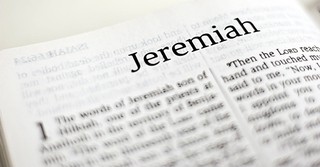Who Was Jeremiah - the "Weeping Prophet"?
Share

A prophet’s life is never easy, but Jeremiah had an especially rough time.
Known as the Weeping Prophet, Jeremiah was a prophet to the southern kingdom of Judah in the Old Testament, right before Judah ultimately fell to Babylon and was led away into captivity. God sent Jeremiah to a crumbling nation to warn of their impending demise – a warning they didn’t heed.
However, Jeremiah’s most lasting legacy may in fact be one of hope. One of the most oft-quoted verses in the Bible, Jeremiah 29:11, has offered hope to believers for centuries. So, who was this weeping prophet in a dying nation who also brought such words of comfort and promise?
Photo credit: ©Getty Images/kieferpix
When Did Jeremiah Live?

It’s important to know the context of Jeremiah’s time in order to understand his life. Part of this requires a partial overview of the history of the Israelites in the Promised Land.
King Solomon ruled over the Israelites, God’s people, in the tenth century B.C. However, the unwise actions of his son Rehoboam led to a schism in which the kingdom was split into the northern kingdom of Israel and the southern kingdom of Judah, each with its own king.
Both kingdoms devolved into corruption and sin, despite repeated warnings from prophets sent by God — prophets such as Jeremiah. Thus, God warned, they would be overtaken by conquerors.
In 721 B.C., the northern kingdom of Israel fell to the Assyrians. The southern kingdom of Judah temporarily pulled itself together under King Hezekiah and avoided destruction from the forces of Assyria under Sennacherib through miraculous intervention (2 Chronicles 32).
However, Hezekiah was immediately followed by his wicked son Manasseh. Manasseh was eventually carried away by Assyrians and repented of his evil ways. But things got worse again as he was followed by Amon, a completely wicked king. Another brief upswing occurred under King Josiah, but after that, Judah was a mess of puppet kings placed by Egypt and Babylon, some reigning for only three months.
Meanwhile, Assyria had been conquered by Babylon. In 586 B.C., the southern kingdom of Judah fell to the Babylonian Empire once and for all, as the walls of Jerusalem were breached, the Temple was destroyed, and the city walls torn down.
Jeremiah served as a prophet from the days of Josiah all the way through the reigns of Judah’s last four kings: Jehoahaz, Jehoiakim, Jehoiachin, and Zedekiah. Jeremiah died in 570 B.C.
Photo credit: Wikimedia Commons/Public Domain Images/Rembrandt
What Does the Bible Say about Jeremiah?

Most of what we know about Jeremiah comes from the book of the Bible that bears his name. Jeremiah was born to a priestly family in Anathoth, about three miles from Jerusalem. He was called as a prophet in the thirteenth year of the reign of King Josiah. For around forty years, Jeremiah spoke for God to the people of Judah.
Though Jeremiah’s birth date isn’t exactly clear, he received God’s call at a young age, probably as a teenager (Jeremiah 1:6). He began proclaiming God’s messages and continued to do so through trial and peril.
After several years of preaching, Jeremiah’s family turned against him and even plotted to kill him (Jeremiah 1:8, 11:21-23, 12:6). Over the years, he was whipped and put in the stocks (Jeremiah 20:1-3), attacked by a mob (Jeremiah 26:1-9), threatened by the king (Jeremiah 36:26), and ridiculed (Jeremiah 28). Some of Zedekiah’s princes had Jeremiah arrested, beaten, accused of treason, and thrown in jail (Jeremiah 37:1-15), from whence he was then thrown in a deep empty well (Jeremiah 38:1-6). He lived through the siege of Jerusalem along with the rest and was there as the people were taken away as captives.
Perhaps worst of all, Jeremiah was alone. He was not allowed to marry (Jeremiah 16:2), and his family abandoned him. The people turned against him and didn’t believe him. He was alone with the knowledge of the horrors coming for Judah.
Photo credit: ©Getty Images/jodie777
What Did Jeremiah Do?

Jeremiah spent forty years delivering God’s messages to Judah. His early messages focused on condemning false worship and social injustice, with calls to repentance. He proclaimed a coming foe, and after the reforms under Josiah, he urged the people to adhere to the covenant (Jeremiah 11). He continually urged focusing on the inner spirit and right actions rather than external religious practice.
Early in Jehoiakim’s reign, Jeremiah delivered his “Temple sermon” (Jeremiah 7:1-15, 26:1-24), denouncing the people for depending on the Temple for security instead of actually turning to God with their hearts. He predicted that God would destroy the Temple if the people didn’t repent. For this, he was arrested. Jeremiah continually denounced Jehoiakim for his selfishness, materialism, and injustice.
Jeremiah also delivered many prophecies/oracles, including ones against other nations such as Egypt. However, his special predictions of desolation were always for Judah. When Jehoiakim withheld tribute from the Babylonians, Jeremiah warned that Judah would be destroyed by Babylon. Many died in a siege of Jerusalem and more were carried off to Babylon in 597.
The Babylonians placed Zedekiah on the throne of Judah. During this time, Jeremiah wrote to the exiles in Babylon, telling them they would not be returning to their homeland anytime soon. Instead, he passed along a message from the Lord telling them to settle in Babylon. This was a captivity for the long haul.
Jeremiah was known for his dramatic object lessons. For example, when emissaries from surrounding nations came to Judah asking the nation to join a rebellion against Babylon, Jeremiah put a yoke on his neck and went about urging the nations to submit to the yoke of Babylon and live (Jeremiah 27:2-11). At the height of the Babylonian siege, on orders from God, Jeremiah bought land in the city of Jerusalem to show that the Jews would one day return (Jeremiah 32:6-25).
Jeremiah preached a lot of doom and punishment. However, his message was ultimately one of repentance and restoration. God was quick to remind his people that although there would be consequences for their sin, He still had a plan. “I will build you up again, and you, Virgin Israel, will be rebuilt. Again you will take up your timbrels and go out to dance with the joyful” (Jeremiah 31:4).
Photo credit: Unsplash/Ben White
Why Is Jeremiah Called the "Weeping Prophet"?

Jeremiah lived at a truly terrible time in history. Not only did he experience the horrors of war, starvation, siege, and captivity, he was called upon to tell the people of it, urging them to repent. Worst of all, they didn’t listen. The below passage well demonstrates the cause of Jeremiah’s agony:
“And if they ask you, ‘Where shall we go?’ tell them, ‘This is what the Lord says:
“‘Those destined for death, to death;
those for the sword, to the sword;
those for starvation, to starvation;
those for captivity, to captivity.’
“I will send four kinds of destroyers against them,” declares the Lord, “the sword to kill and the dogs to drag away and the birds and the wild animals to devour and destroy…
“Who will have pity on you, Jerusalem? ...
You have rejected me,” declares the Lord.
“You keep on backsliding.
So I will reach out and destroy you;
I am tired of holding back ...
I will bring bereavement and destruction on my people,
for they have not changed their ways.
I will make their widows more numerous
than the sand of the sea ...
I will put the survivors to the sword
before their enemies,”
declares the Lord. (Jeremiah 15:2-3, 5-9)
“Alas, my mother, that you gave me birth!” Jeremiah wails in Jeremiah 15:10. Many times, he cries out to God, even lashing out, as in Jeremiah 15:18.
Jeremiah witnessed, both in foresight and real time, the destruction of his people. Upon Judah’s captivity, he penned the book of Lamentations, a highly poetic and devastatingly beautiful series of laments about the fall of God’s people.
Jeremiah spent forty years telling the people what would happen. And they didn’t listen.
Photo credit: ©Getty Images/KatarzynaBialasiewicz
What Does the Book of Jeremiah Teach Us?

The book of Jeremiah offers many valuable lessons. However, two of the most important lessons are those of repentance and God’s faithfulness.
Judah was sent into captivity, the Promised Land stripped from them, and it was entirely their own fault. They were warned, over and over and over, but they did not repent. God did not deal with them with any unusual harshness; in fact, the fact that he gave the wicked people such a long time to repent shows His love. “I have loved you with an everlasting love,” God says in Jeremiah 31:3. He sent dozens of messengers proclaiming repentance, but these messengers were killed, abused, and mocked.
God gave opportunity after opportunity for repentance. Our God is a God of forgiveness. But when we refuse this forgiveness, a just God can only allow wickedness to continue for so long.
So what happens when we don’t repent? What happens when we mess up badly, like Judah, and end up in a terrible situation that is entirely of our own causing?
It turns out that God doesn’t abandon us then, either.
In one of the most famous passages in the Bible, Jeremiah 29:11, God addresses the captive Jews. “‘For I know the plans I have for you,’ declares the LORD, ‘plans to prosper you and not to harm you, plans to give you hope and a future.’”
And thus, He continues:
“‘In that day,’ declares the LORD Almighty, ‘I will break the yoke off their necks and will tear off their bonds; no longer will foreigners enslave them’” (Jeremiah 30:8).
“I will build you up again, and you, Virgin Israel, will be rebuilt. Again you will take up your timbrels and go out to dance with the joyful” (Jeremiah 31:4).
“‘I will bring health and healing to it; I will heal my people and will let them enjoy abundant peace and security. I will bring Judah and Israel back from captivity and will rebuild them as they were before. I will cleanse them from all the sin they have committed against me and will forgive all their sins of rebellion against me. Then this city will bring me renown, joy, praise and honor before all nations on earth that hear of all the good things I do for it; and they will be in awe and will tremble at the abundant prosperity and peace I provide for it’” (Jeremiah 33:6-9).
No matter how low we have fallen, we have not fallen from the love of God, and we are not beyond the reach of His plans.
Photo credit: ©Getty Images/stevanovicigor
What Happened to Jeremiah? How Did He Die?

After Jerusalem was destroyed, the Babylonians released Jeremiah from prison and allowed him to live in the land under the protection of a governor. Unfortunately, the governor was murdered two months later, and Jeremiah was carried off to Egypt against his will by Jewish rebels. The Bible doesn’t say exactly what happened to him, but it is known that he died there, possibly killed by the very people who brought him there, according to extrabiblical sources.
Jeremiah led a tumultuous life, and, most likely, death. However, his words live on thousands of years later, offering teaching and hope even today. Jeremiah served God even when it meant giving up everything and facing persecution in a culture that had abandoned God.
Are we willing to do the same?
Photo credit: Unsplash/Isabella Juskova

